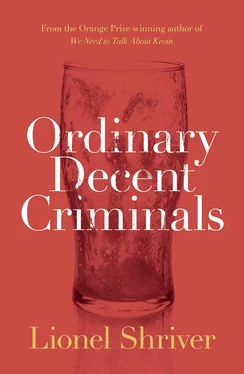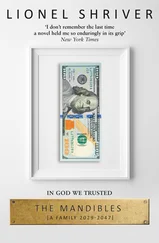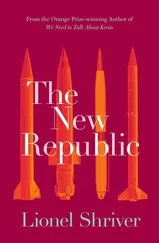Don’t get the wrong idea. This left Farrell in a conflicted position—Catholics didn’t wear poppies and Prods did, but if Farrell were Protestant, being Farrell, he would refuse to wear a poppy, so to express this alienation in Catholic terms should he wear one instead? For his own people had excluded him as well, or he’d excluded himself; each had leapt to disown the other. Farrell despised groups of all kinds and made sure they despised him in return; then he needed the backs of crowds to feel wholly, spitefully himself. He was no different from the rest of this tip, where you loved your enemy all right, but not quite the way Christ had in mind—loved him precisely for being your enemy, for obliging you with something outside your own mirror to revile.
He was easy to locate, thick platinum hair curling over the crowd. The large crown and high forehead bent toward his boisterous companion. While Estrin found Irishmen a frumpy crew, given to bundling—they wore sweaters with their suits, jackets binding and short in the arm—Farrell’s dark wool three-piece was impeccably tailored, European; his crimson tie, silk handkerchief, and long Dickensian overcoat suggested a kind of style she’d not seen on this island—that is: style.
And, she observed on the way over, he was a drinker, since in this deluge of a country whiskey was the only force of nature that gave the national complexion any color at all. So she was surprised on arriving at their corner to find his measure clear.
“Hot water,” he explained.
“You don’t drink?”
“Wine. After eight.”
“A.m. or p.m.?”
“I sleep little enough to lose the distinction.”
Estrin raised her malt. “I like to break my rules from time to time.”
“You can afford to,” he said severely. “You’re still young.”
“Not that young,” said Estrin with a trace of irritation. “And I can’t afford not to. Too many rules and too much obedience are just as dangerous as going off the deep end.”
“Don’t you worry now,” said the heavier man, slapping his friend on the back. “Farrell O’Phelan’s in no danger of being too obedient a boy, or too faint a drinker, either. Knows how to impress the ladies with a cup of hot water at tourist draws, is all.” He laughed, though Farrell didn’t, exactly, join in.
“You brought me here to torture me,” said Farrell, and meant it; the smell was beginning to get to him. How happy it would make MacBride if he strode up to the bar and threw back a double. And how it firmed his resolution, to deny Angus that joy.
“Now, it was damned decent of Bushmills to open today. And I could hardly meet you at the cenotaph this morning,” MacBride muttered. “Sure you’d hum ‘The Battle of the Bogside’ all through the two minutes’ silence.”
Farrell was about to quip that he was more likely to hum Polish polkas than some whimper of Irish resistance, when he noticed the American’s eyes had sharpened; most foreigners here were clueless, but he did not like the way she looked from one to the other and he did not like the way she looked at MacBride. He shut up. He did not want to be understood. That was the first thing women didn’t understand.
“The fumes off that wort were something, what?” recalled the girl. “Ripped in thirty seconds. Like sniffing glue, and the end of the tube is six feet wide.”
“You sniff glue?” asked Farrell.
“Putting together balsa Sopwith Camels at eight or nine? We breathed too much, they didn’t fly so hot, but we’d had a good time. My life has had to do with airplanes from way back.”
“How so?”
“I’m tempted to return-address envelopes, ‘Window seat. Nonsmoking.’ Though I don’t send so many letters anymore … Lufthansa,” she commended.
He clucked. “Free cocktails, but frozen salad.”
“You travel much?”
“Same address, but on the aisle.”
“Long legs.”
“I like to be the first off the plane.”
“I like to look out the window. Flying into Belfast I was pressed so close to the pane that the man next to me asked if this was my first flight.”
“And you said?”
“ Always . I never get bored with flying. Though I am sympathetic to the aisle seat,” she noted. “My mother claims I used to stand in my crib and plead through the bars: Ah wan ow . She was impressed that I started talking in a whole sentence. But I’m impressed what it meant.”
“Which was?”
“I want out.”
“And have you? Gotten out?”
She seemed to consider this more seriously than the facile question required. “Maybe not.” Abruptly she accused him, “I have it on good authority that locals never touch this place. You don’t even drink whiskey. What are you doing here?”
“Is this an interrogation?”
“Are you used to being interrogated?”
Farrell faltered, and wondered momentarily if she knew who he was—ridiculous. “Just—a diverting opening.”
“You play chess?”
“Aye, and you?”
“No. I wouldn’t have wanted to learn unless I was great. And I don’t quite have that kind of brain. So instead of being second-rate, I just don’t play.”
“Then you do have that kind of brain,” Farrell observed. “Abstention is a strategy.”
“Never will forget that first game,” MacBride nosed in again. “This sorry scarecrow teetering to the board. I shook his hand and nearly crushed it—a sickly sort, this one. But ten moves later, who’d have guessed he had it in him? Loopy, I thought, the boy’s in a fever!”
“But I won.” Farrell poked MacBride’s chest in a gesture he realized too late was exactly like his own father’s.
“’Twas not a sound game, mate. Later that same afternoon I sat down to me own board and had you hammered three ways round.”
“The gentleman at your right plays a sedulous game,” Farrell explained. “Uses all the time on his clock. Knows all the books—”
“You could stand yourself—”
“Never! Never opened a page.”
“Your man here considers learning a cheat.”
“There seems little point in testing some other gobshite’s wits when the idea’s to test your own.”
“I thought winning was all, Farrell. Why not read up, then, if it topples the other fellow’s king?”
“I don’t collaborate, at anything. I win.”
“We might observe,” said MacBride dryly, “that by that arrangement you get singular credit for falling on your arse.”
“When you two play,” asked the girl, “who does win, anyway?”
“Did,” said MacBride.
“Oh, we still play,” said Farrell softly.
At last MacBride had given up ogling the girl, because he couldn’t resist looking at Farrell; funny, they were both showing off, for they had often used each other, or perhaps more accurately their relationship, to entice women. “I was trying to tell you, lass”—MacBride turned back to her—“the gawk here played reckless chess. Might seem a tame sport from the side, but your man conduct his pieces like commanding his crew into uncharted high seas. Could make you woozy to watch the board.”
“And you,” said Farrell, “never made an original move in your life.”
“No such thing as an original move. That’s your vanity, and your ignorance is vanity. It trips you, too. I always watched the larger game. You got too caught up in your flourishes, your flashy attacks. You wanted to impress me. It was the ruin of you.”
“Fischer and Kasparov were both victorious.”
“Aye, and where’s Fischer now? Crawled off in a hole.”
“Why did he quit?” asked the girl.
“Couldn’t keep it up!” cried MacBride.
“No,” said Farrell. “He was disgusted. Sick to death.”
Читать дальше












